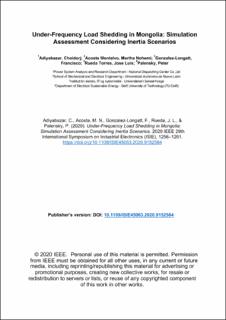Under-Frequency Load Shedding in Mongolia: Simulation Assessment Considering Inertia Scenarios
Adiyabazar, Choidorj; Acosta Montalvo, Martha Nohemi; Gonzalez-Longatt, Francisco; Rueda Torres, Jose Luis; Palensky, Peter
Peer reviewed, Journal article
Accepted version
Permanent lenke
https://hdl.handle.net/11250/2759227Utgivelsesdato
2020Metadata
Vis full innførselSamlinger
Originalversjon
Adiyabazar, C., Acosta, M. N., Gonzalez-Longatt, F., Rueda, J. L., & Palensky, P. (2020). Under-Frequency Load Shedding in Mongolia: Simulation Assessment Considering Inertia Scenarios. 2020 IEEE 29th International Symposium on Industrial Electronics (ISIE). https://doi.org/10.1109/ISIE45063.2020.9152584Sammendrag
Mongolia power system (MPS) is evolving quite fast, and the integration of renewable resources (mainly wind power and solar photovoltaic) reached 20% by 2019. The MPS is interconnected to Russia in order to cover local energy deficits, especially during freezing winters. However, the interconnection to Russia is a sensible element of the MPS, especially from the frequency control and stability point of view. This situation was evident during the sudden disconnection of the two interconnecting lines that provoked the major event of 29 th June 2018, disconnecting 112 MW by the action of the Under-Frequency Load Shedding (UFLS) and making more than 1.5 million without electricity that day. This paper is dedicated to using numerical time-domain simulations to assess the existing UFLS schemes installed in the MPS. As the MPS is especially sensitive to disconnection from the Russian grid, this event is used to assess the suitability of the UFLS considering two scenarios: Summer and Winter. Results of this research paper have demonstrated that the actual UFLS scheme is not enough to avoid frequency collapse in real-life conditions during the Summer low-demand and low inertia scenario.
